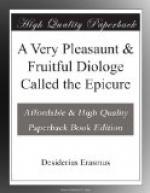then thei whyche lyue vertuouslye, and agayne, none
in more sorowe and calamytie then those that || lyue
vngratiously. Spu. Then I haue grauted more
the I thought I had. He. But what thing you
haue ones cofessed too bee true (as Plato sayth)
you should not deny it afterward. SPV. Go furth
with your matter. HEDO The litle whelpe that
is set store and greate price by, is fed most daintely,
lieth soft, plaieth and maketh pastime continually,
doo you thinke that it lyueth plesautly? SPV.
It dooeth truely. HEDO. Woulde you wyshe to
haue suche a lyfe? SPV. God forbyd that, excepte
I woulde rather bee a dogge then a man, HEDO.
Then you confesse that all the chief pleasures arise
and spring fro the mynd, as though it were from a
welspryng. SPV. ||C.iii|| That is euident ynough.
HE. Forsoth the strength and efficacy of the
minde is so great, that often it taketh away the felyng
of al externe and outward pain & maketh that pleasaunt,
which by it selfe is very peynful. SPV. We se
that dayly in louers, hauyng great delight to sytte
vp long & too daunce attendaunce at their louers doores
all the colde wynter nyghtes. HEDo. Now weigh
this also, if the naturall loue of man, haue suche
great vehemency in it, which is a comune thyng vnto
vs, both with bulles and dogges, howe much more should
all heauenly loue excell in vs, which cometh of ye
spirit of Christ, whose stregthe is of suche power,
that it ||would make death a thig most terrible, too
bee but a pleasure vnto vs. Spu. What other
men thike inwardly I know not, but certes thei wat
many pleasures which cleaue fast vnto true and perfect
vertue. He. What pleasures? Spu. Thei
waxe not rich, thei optein no promotio, thei baket
not, thei dauce not, thei sing not, thei smell not
of swete oyntmetes, thei laugh not, thei play not.
He. We should haue made no mention in thys
place of ryches and prefermente, for they bryng wyth
them no pleasaunt lyfe, but rather a sadde and a pesiue.
Let vs intreate of other thynges, suche as they chiefely
seeke for, whose desyre is to liue deliciously, see
ye not daily ||C.iiii|| drokerdes, fooles, and mad
menne grinne and leape? SPV. I see it HED.
Do you thynke that thei liue most pleasautly? SPV
God send myne enemies such myrth & pleasure. HE.
Why so? Sp. For ther lacketh emongist the sobrietie
of mind. HE. Then you had leuer sit fastyng
at your booke, then too make pastime after any suche
sorte. SP. Of the both: truly I had rather
chose to delue. H. For this is plaine that
betwixt the mad ma & the drukerd ther is no diuersitie,
but that slepe wil helpe the one his madnes, & with
much a doo ye cure of Physicions helpeth the
other, but the foole natural differeth nothing fro
a brute beast except by shape and portrature of body,
yet thei || be lesse miserable whom nature hathe made
verye brutes, then those that walowe theim selues




